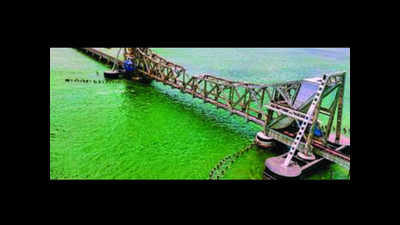- News
- City News
- madurai News
- Algal bloom kills fish off Pamban coast
Trending
This story is from September 14, 2019
Algal bloom kills fish off Pamban coast

The seawater turn green near the beaches of Pamban, Kurusadai island, Kunthukal and neighbouring places two days ago and some dead fishes too a day later
MADURAI: Thousands of fish floated dead off the shores of Pamban till Rameswaram following a sudden toxic algal bloom, forcing scientists to issue warning against people consuming them. Fishermen said that they saw the seawater turn green near the beaches of Pamban, Kurusadai island, Kunthukal and neighbouring places two days ago and some dead fishes too a day later.
On Thursday, the fisher folk were panic-striken after seeing thousands of dead fish floating off the coast, some of them so bloated that the people refrained from even touching them.“We know how to differentiate between dead and rotten fish. We will never take home the decayed fish,’’ said Joseph,a fisherman .
The fishermen fear that the toxic algae may wipe out the entire stock of fishes as a many varieties of fish have began floating dead near the beach.
Around 3,000 fishes were found dead on Thursday, and the number a litter less on Friday. Many varieties including parrot fish and emperor fish were found dead in hoards . Principal scientist at Central Marine Research Institute in Mandapam, R Jeyakumar, said that the fish died due to green algae, also known as nautiluca, which bloomed due to the rising conducive seawater temperature.
Other conditions that had aided the blooming of this algae were low water currents and lack of winds, and lesser tidal amplitude. He said that the algal bloom could have started about five to six nautical miles off the beach, but the blooming algae may have drifted towards the beaches due to lack of heavy winds and strong waves. This resulted in the water turning green which choked the fish.
Unlike the algal bloom seen off the beaches of Chennai, these algae were not bioluminescent (producing light) and are green. As the fish take in the oxygen, the spores and algae choke the gills of the fish leading to their death. “The condition is expected to be clear in a day or two, as the water currents were getting stronger and the winds were blowing, which sweep away the algae from the shore,’’ he said.
People have been warned against consuming the dead fish found floating near the shore, as the dead fish could contain the algae which may be poisonous. The algae and bacteria start feeding on the tissues of the dead fish which would become spongy. Hence, eating these fish that are decomposed is dangerous.
On Thursday, the fisher folk were panic-striken after seeing thousands of dead fish floating off the coast, some of them so bloated that the people refrained from even touching them.“We know how to differentiate between dead and rotten fish. We will never take home the decayed fish,’’ said Joseph,a fisherman .
The fishermen fear that the toxic algae may wipe out the entire stock of fishes as a many varieties of fish have began floating dead near the beach.
Around 3,000 fishes were found dead on Thursday, and the number a litter less on Friday. Many varieties including parrot fish and emperor fish were found dead in hoards . Principal scientist at Central Marine Research Institute in Mandapam, R Jeyakumar, said that the fish died due to green algae, also known as nautiluca, which bloomed due to the rising conducive seawater temperature.
Usually the temperature of the seawater ranges between 27 degrees centigrade to 30 degrees centigrade. However, the temperatures had increased to 30 degrees C to 32 degrees C for the past two days, which has been conducive for the algal bloom.
Other conditions that had aided the blooming of this algae were low water currents and lack of winds, and lesser tidal amplitude. He said that the algal bloom could have started about five to six nautical miles off the beach, but the blooming algae may have drifted towards the beaches due to lack of heavy winds and strong waves. This resulted in the water turning green which choked the fish.
Unlike the algal bloom seen off the beaches of Chennai, these algae were not bioluminescent (producing light) and are green. As the fish take in the oxygen, the spores and algae choke the gills of the fish leading to their death. “The condition is expected to be clear in a day or two, as the water currents were getting stronger and the winds were blowing, which sweep away the algae from the shore,’’ he said.
People have been warned against consuming the dead fish found floating near the shore, as the dead fish could contain the algae which may be poisonous. The algae and bacteria start feeding on the tissues of the dead fish which would become spongy. Hence, eating these fish that are decomposed is dangerous.
End of Article
FOLLOW US ON SOCIAL MEDIA










